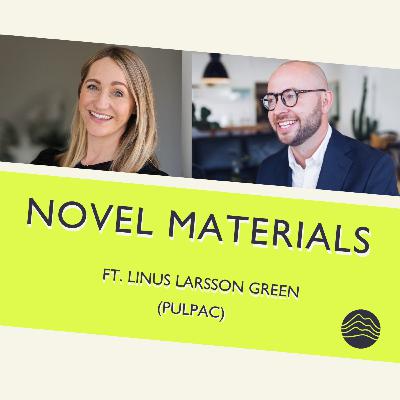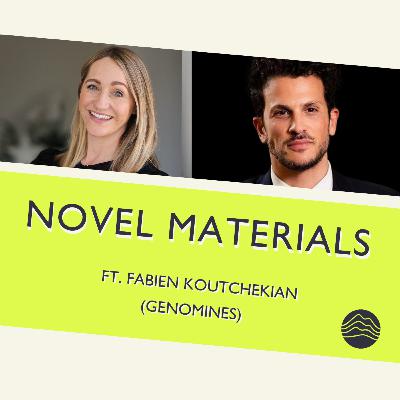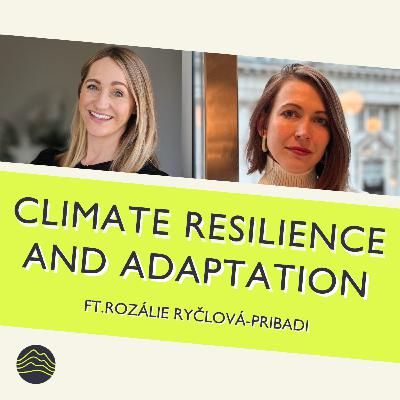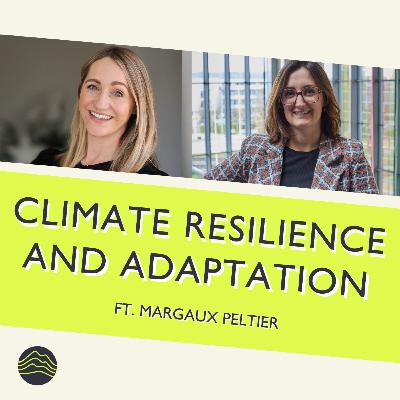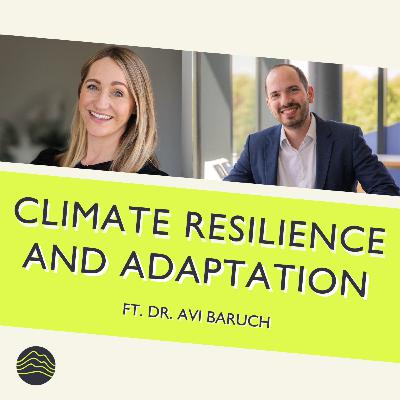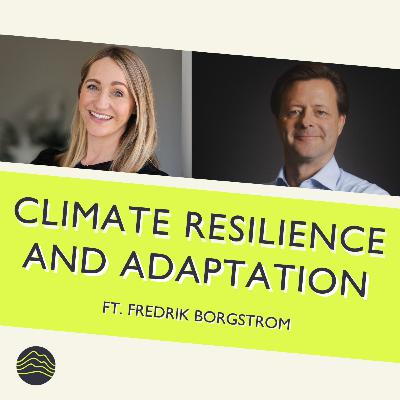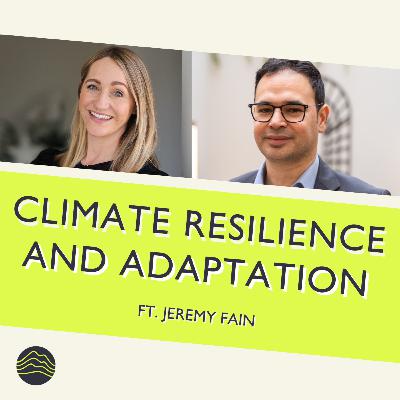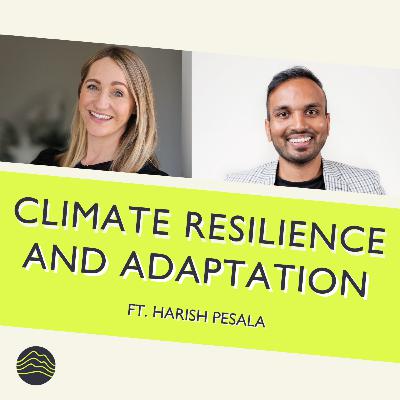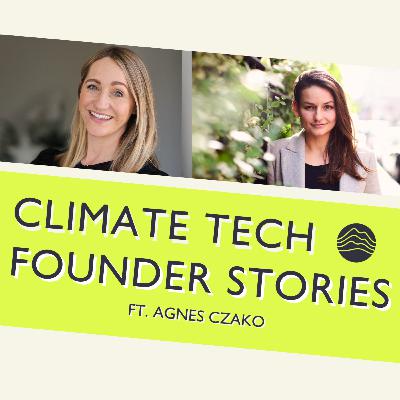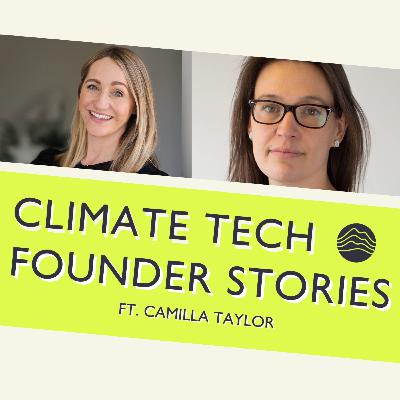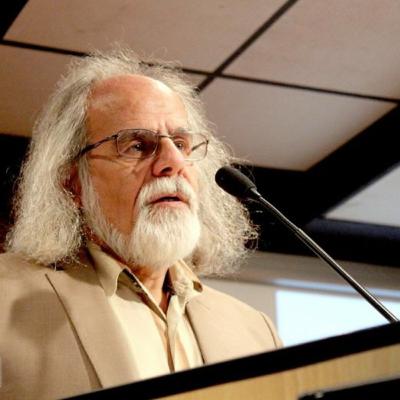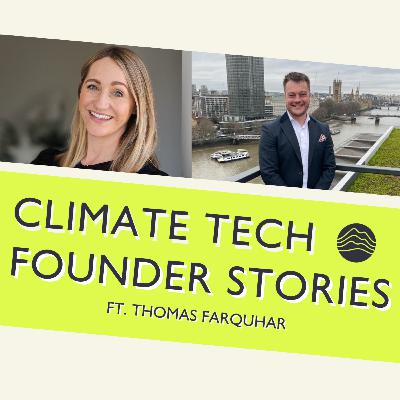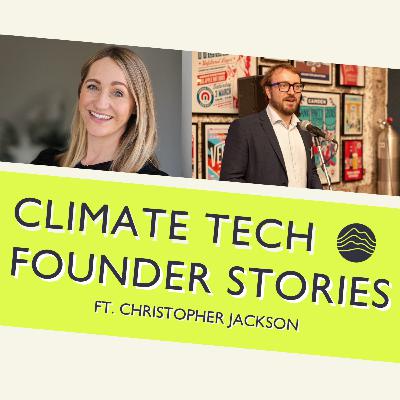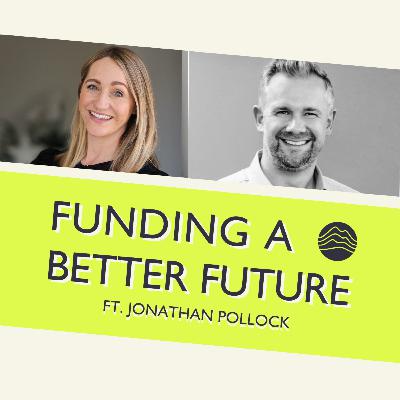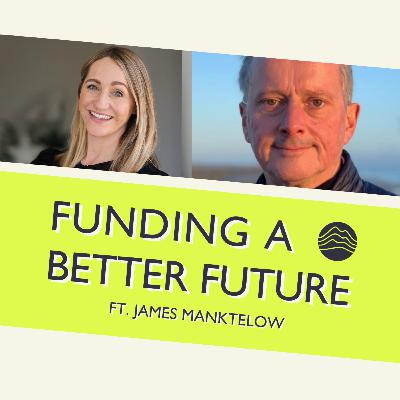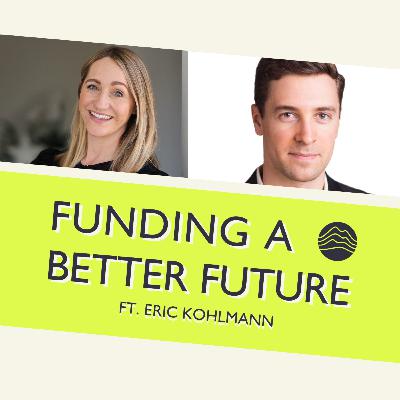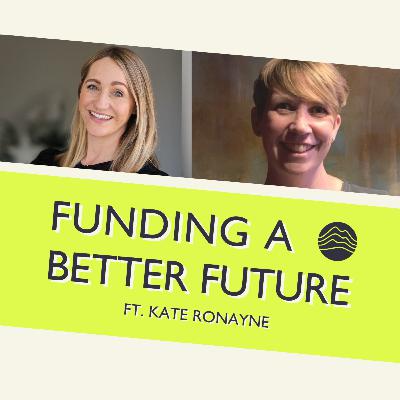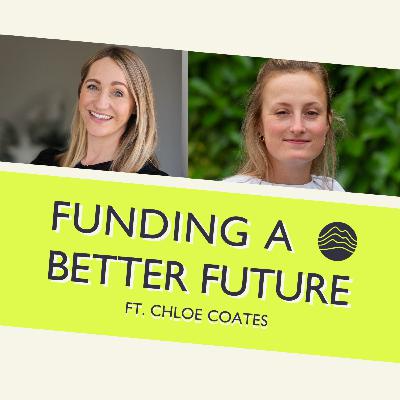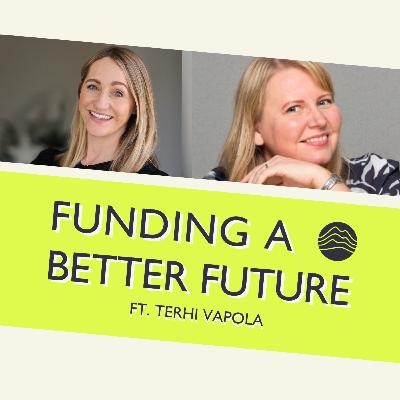Discover The Climate Pioneers Show
The Climate Pioneers Show

The Climate Pioneers Show
Author: Cherry Swayne
Subscribed: 0Played: 0Subscribe
Share
© Cherry Swayne
Description
Welcome to The Climate Pioneers Show.
Each season we focus on a different area of climate technology, exploring the highs and lows of building and scaling climate start-ups.
We feature founder stories from the front line, fundraising advice from impact investors, and tips about how to build and support a team of A-players to save the planet.
Hosted by Cherry Swayne, founder of Above & Beyond Recruitment, angel investor and climate talent specialist.
Happy listening!
Hosted on Acast. See acast.com/privacy for more information.
86 Episodes
Reverse
Linus Larsson Green is the co-founder and CEO of PulPac, a Swedish deep-tech company pioneering dry moulded fibre, a breakthrough manufacturing technology that turns cellulose pulp into packaging and single-use products that can fully replace plastic.Every year, we produce more than 400 million tons of plastic, with a huge chunk of that used just once but PulPac are tackling that problem head on… PulPac’s unique process uses 90% less water than traditional methods and slashes carbon emissions, while still retaining the ability to mass-product fibre cups, trays and lids at global scale.Over the last 7 years, PulPas has raised major funding, built a network of international licensees and partnered with some of the world’s biggest packaging players. I’m very much looking forward to hearing about this journey in more detail Hosted on Acast. See acast.com/privacy for more information.
Today, I’m speaking with Armando Leal Puente, co-founder and managing director of Eutechtics, a deep-tech startup based in Sheffield, that’s taking on one of the biggest challenges in climate and industry - decarbonising the chemical supply chain.Eutechtics has built a platform called EvoCarbon, which turns captured CO₂ into valuable chemical building blocks - things like carboxylic acids that go into everyday products such as cosmetics, food ingredients, pharmaceuticals and even plastics which are currently made using fossil fuels.Armando and his team are reimagining how we make the molecules that power modern life, proving that sustainability and profitability don’t have to be at odds. In just a few years, they’ve secured national innovation funding, won major cleantech awards, and attracted the attention of investors and industry alike. Hosted on Acast. See acast.com/privacy for more information.
Fabien Koutchekian is the co-founder and CEO of Genomines, a start-up pioneering the extraction of nickel from the ground. Instead of bulldozers and explosives, Genomines uses genetically enhanced plants, called hyperaccumulators, to pull nickel out of the soil. The result is a process that could deliver battery-grade metal with a fraction of the environmental footprint of traditional mining. With such transformational potential, it’s not a surprise that they successfully closed an incredible $45m Series A raise in September 2025. Hosted on Acast. See acast.com/privacy for more information.
Rozalie Ryclova-Pribadi is Chief Strategy Officer and a driving force at MaxInfo. The company uses advanced analytics to help their customers move from reacting to disasters to anticipating them. The Financial Times has said, ‘Extreme weather and climate change caused more financial damage in Europe between 2020 and 2023 than it did in the whole preceding decade', so we’re entering a new era where predicting, anticipating and managing this increasingly common events is more important than ever - and MaxInfo are building the tools to help organisations do exactly that.1:58 - Intro to MaxInfo and the problem they are solving 5:03 - How did the MaxInfo team come up with the initial idea? 7:35 - How much of education gap is there between what you offer and the customers you work with? 10:47 - What markets or customers are you aiming for in the future? 12:59 - The geographical applications and focus for MaxInfo 14:44 - Rozalie’s journey to joining MaxInfo 16:13 - How has Rozalie’s background helped in this role? 18:07 - MaxInfo’s experience with Innovate UK 23:31 - How con companies combine angel investment alongside grant funding? 26:26 - What has it been like going for a VC round recently? What challenges did you face? 29:10 - How have you seen things change since you did VC fundraising in previous roles? 31:34 - How have you built the team at MaxInfo? 34:42 - How did you decide whether to be hybrid or remote? 36:16 - Do you foresee any challenges with building the team in the future in terms of finding deep expertise or being totally invested in your mission? 38:48 - What are key milestones for MaxInfo in the coming months? 40:06 - Rozalie’s advice for other founders Hosted on Acast. See acast.com/privacy for more information.
Margaux Peltier is the co-founder and CEO of Enerdrape, a Swiss startup turning underground infrastructure into renewable energy sources. From parking garages to metro tunnels, Enerdrape’s modular geothermal panels harness untapped subterranean heat to provide sustainable heating and cooling for buildings without disruptive drilling or invasive construction.Margaux’s background in HVAC design and engineering was followed by a Masters in Civil Engineering in Lausanne where her thesis formed the basis of Enerdrape’s technology. Since then, she has led Enerdrape through award-winning pilot projects in Switzerland and ambitious expansions into the US, including Chicago’s largest underground parking complex.2:08 - Margaux’s journey from her Master’s thesis to co-founding Enerdrape 3:30 - The scale of the problem Enerdrape is solving 4:45 - How Enerdrape’s geothermal product is unique in not needing invasive drilling and is good for retrofit 6:46 - How are existing spaces being heated and cooled? 8:52 - How did you commercialise the product and what support did you get from your university? 13:13 - Enerdrape’s first commercial project in Lausanne 14:19 - As academic co-founders, how did you handle not having previous sales experience and what advice would you have for others trying to win their first pilots? 17:11 - How has the way you sell your product changed as you’ve learnt more about what your clients are looking for? 22:23 - At what point did you make the decision to go into international markets and how have you found it breaking into the US market? 28:17 - At what point did you need to raise institutional funding outside the university and what was that process like? 30:51 - Lessons from raising a seed round 33:02 - As a young, first-time, female founder, did you feel you faced any challenges or faced any bias during fundraising? 36:19 - How has your team changed and grown since inception? 40:12 - What have been your biggest learnings as you’ve grown the team and as you’ve developed as a manager? 45:40 - What are you excited about for Enerdrape in the next 12-18 months? 47:30 - Margaux’s advice and resources for other founders Hosted on Acast. See acast.com/privacy for more information.
Dr. Avi Baruch is co-founder and Chief Product Officer of Previsico. Spun out of almost 20 years of groundbreaking research at Loughborough University, the team has developed the Flood Intel Platform - the world’s first real-time, surface-water flood forecasting system. Their mission is to save millions of lives, whilst also helping governments and businesses to save billions on the cost of flooding. Avi and the founding team have taken Previsico from academic research to securing over 200+ customers, operating in multiple geographies, closing over £10 million in funding and scaling the team to over 50 people.2:02 - Intro to Previsico from academic research to spun-out commercial prospect 3:52 - What moment made you realise you had a unique solution to a big problem? 5:12 - What is the scale of the problem around surface flooding? 6:25 - What were some of the benefits of starting out being incubated in an academic environment? 7:53 - What challenges did you face moving from academia into being a first-time founder? 9:58 - How did you find your CEO? 11:45 - How did you commercialise what you’re doing, and what markets did you go after first? 15:33 - When did you know the time was right to branch out into international markets? 17:18 - What frameworks do you have in place to keep you focussed as a company and avoid distractions? 19:27 - What are the main tensions in building a product that is deeply technical but also has to have clear commercial outcomes? 22:00 - How was Previsico initially funded after spinout and how has fundraising progressed? 24:21 - What do you think made you successful in your fundraising? 26:05 - How do you feel the risk resilience market has changed in the seven years since Previsico started? 28:32 - How has the team grown, and what have you done well in that process? 30:34 - What have you learnt along the way about recruiting and retaining a team? 32:05 - At what point did you feel it was the right time to bring in your People and Culture Manager? 33:48 - How has the company culture developed? 36:09 - What practical things do you do with your team to allow for feedback and to help them feel safe enough to question and give feedback? 39:32 - What’s coming up for Previsico over the next year to 18 months? 41:54 - Avi’s advice for other founders Hosted on Acast. See acast.com/privacy for more information.
Fredrik Borgström is the CEO of Skyfora, a Finnish startup reinventing weather intelligence. Skyfora’s technology transforms cell towers into a dense network of atmospheric sensors, generating up to a thousand times more weather data than traditional systems. Combined with advanced AI models and ultra-light radiosondes, this approach promises faster, sharper forecasts for everything from disaster response to renewable energy planning.1:30 - Fredrik’s career to-date.3:45 - How did you come to build Skyfora and what solution are you developing?8:17 - What was your GTM plan for Skyfora?11:40 - How did you decide which customers to go for first?13:49 - Are there certain markets that work better for what you do or any that are more challenging?17:09 - How much opposition or fear are you met with from telecoms providers when trying to get access to their infrastructure?19:56 - What was your funding journey like and what was the appetite like from investors?24:24 - What has your recent fundraise unlocked for you?27:06 - What has gone well or been difficult when building out the team?28:03 - What has enabled you to attract such strong talent?28:39 - How has your role developed from originally being VP of Sale to now being CEO?31:33 - How early in the journey of the company did you build your board of advisors and how did you find them?32:56- What lessons did you learn from previously taking a business through to exit, that you bring with you to Skyfora?35:41 - What is the culture like at Skyfora?37:27 - How do you ensure that team members have the resilience required to work in a startup?39:05 - What are the Skyfora team focusing on for the next couple of years?41:06 - What advice would you give to fellow founders? Hosted on Acast. See acast.com/privacy for more information.
Jeremy Fain, CEO of Blue Water Intelligence joins me for this episode. After a decade leading SaaS companies, Jeremy shifted his focus to climate and water technology, co-founding BWI to help governments, hydropower operators, insurers and communities forecast and manage water risks in a changing climate.Water is arguably our most critical and increasingly unpredictable resource and BWI is at the forefront of using space and earth data to improve decision-making about floods, droughts and water security. 1:49 - What is BWI doing and why is it so critical?3:05 - How did you come to move into climate resilience?4:41 - How did you find the learning curve personally and how did you bring experts in?6:16 - From a commercial perspective, who are you building this for and who are your key customers?7:55 - How did you manage going to market in both public and private sectors?9:39 - What did you find particularly challenging in the commercial and GTM process?12:17 - How BWI can help hydro-power to be more effective.16:09 - How has BWI been involved in developing hydro-power in Nepal?17:54 - How has your previous experience helped you at BWI?21:25 - When did you decide you needed to make your first hires and how did you go about building out the team?24:52 - When interviewing, how do you establish that people have both a learning curiosity and the hard skills needed to work at BWI?27:32 - What has fundraising been like?36:44 - Why do you think investors should be getting involved with hydrological forecasting?39:06 - What are you excited about in the future of BWI?40:56 - What advice would you offer to fellow founders? Hosted on Acast. See acast.com/privacy for more information.
For the first episode of this series I am joined by Harish Pesala, the co-founder and CEO of SmartResilience, a climate analytics platform helping organisations predict, prepare for, and reduce the impact of extreme weather and other physical risks. Harish launched SmartResilience to close a critical gap between climate science and real-time decision-making. The company has won Innovate UK’s Young Innovators Award, been shortlisted for the edie Awards and National Sustainability Awards, and is already working with major clients from supermarkets to insurers, to make adaptation both practical and actionable.2:52 - What led you to focus on adaptation and why is this critical to the climate crisis?4:51 - How did you work through your career from British Army Reservist to entrepreneur?7:45 - What were the early days like, especially as it was in 2020?10:50 - How did you secure your first clients?12:27 - How did you adapt from having been a technical co-founder to picking up other skills around sales etc.?15:09 - How has user feedback influenced your product as it’s evolved?18:21 - Where are you seeing risk on the corporate agenda now and who within large enterprise businesses is owning it?20:27 - As the world has changed, have you changed how you position SmartResilience?22:28 - How important have industry recognitions and awards been to you?24:12 - How was your fundraising journey?29:57 - How did you go about building your team, initially with angel investor money and then with higher investment later on?32:02 - How do you know whether someone has the grit and resilience they have to work in a startup?33:47 - How has your team grown?36:31 - How did you decide which roles to hire for and when?40:16 - How has your role adapted since the business began?43:05 - Where have you found your mentors and angel investors?44:38 - How do you see the climate resilience and adaption environment evolving in the future?50:29 - What is one key lesson that has been crucial to your success as a founder? Hosted on Acast. See acast.com/privacy for more information.
As the CEO and Founder of AirEx, Agnes Czako is spearheading the mission of the company - fighting the dual challenges of fuel poverty and climate change. AirEx is a London-based climate tech company developing smart home solutions that reduce heat demand in buildings. They are disrupting the building retrofit market by providing a connected-homes solution with technology that’s simple to install and simple to use. As of 2024, over 30,000 AirEx units have been deployed all over the UK.For series 9 of the Climate Pioneers Show, we're hearing founder stories from across climate tech. We'll be chatting about the highs, the lows, fundraising, commercialising, scaling, building teams and more.2:09 - The journey to founding AirEx4:23 - How the AirEx air brick was brought to life7:37 - Can all homes benefit from these air bricks and can they be retrofitted?8:25 - How does the tech in the air brick work?9:08 - What was it like doing this as a solo founder?11:08 - As a first-time founder, did you have support from mentors or communities?14:12 - How was the Series A fundraising process?17:06 - How did you put together your first angel round when you were starting out in the industry and still building your network?20:00 - The differences between raising an angel round and VC-backed round22:39 - Moving from research to commercial traction26:08 - How the AirEx team has evolved27:50 - How AirEx’s culture was defined and how it has been maintained as the team grows29:47 - How have you built mission-alignment into the recruitment process?32:16 - What makes AirEx a great place to work?33:58 - How have you ensured diversity within the team?36:44 - What would you like to see change across policy and building design?38:46 - Plans for the future of AirEx40:12 - Advice for fellow climate founders Hosted on Acast. See acast.com/privacy for more information.
Camilla Taylor is CFO of SatVu. She holds a degree in Biological Sciences from Oxford University, a master's in Environmental Economics, and an MBA from Columbia and London Business Schools. This academic background provides the ideal foundation for her work at the intersection of environmental sustainability and financial strategy.Camilla’s extensive experience of securing funding and scaling companies has prepared her well for this role, overseeing financial operations and assisting in closing a fundraise of £20 million for the business in 2024. SatVu’s mission is to become the "world’s thermometer from space”, by launching high-res thermal imaging satellites that collect thermal data that enables monitoring of energy efficiency, and climate change mitigation efforts.1:56 - Intro to SatVu4:29 - Camilla’s career journey into climate7:22 - Camilla’s move from investor into an operator / CFO role8:29 - How Camilla’s academic and investor background has helped her as an operator10:31 - How Camilla came to meet the team at SatVu13:30 - Are there common themes seen across scaling startups?16:40 - At what point should a startup to bring in a CFO?20:17 - What are some of the main financial mistakes in startups? What can be done to avoid these?25:23 - What was the key to SatVu’s fundraising success? And what are investors looking for?28:39 - What challenges and risks has SatVu faced?30:34 - What was the impact of the satellite loss across the business in 2023?32:17 - How did the satellite loss impact investor confidence?33:54 - What stood out about how SatVu’s leadership handled the satellite failure?34:40 - SatVu’s plans for the future36:37 - SatVu’s work alongside conflict of interest and international data access37:40 - Where to find out more about SatVu and watch their satellite launches Hosted on Acast. See acast.com/privacy for more information.
Bill Yost is Co-founder and CEO at Reclinker (formerly Cambridge Electric Cement). For more than 25 years, Bill has supported early-stage companies spanning hydrogen generation, water treatment, thermal storage and the recycling of carbon fibre, to bring climate solutions to market.For series nine of the Climate Pioneers Show, we're hearing founder and senior leader stories from across climate tech. We'll be chatting about the highs, the lows, fundraising, commercialising, scaling, building teams and more.1:51 - How Reclinker was founded5:24 - The scale of the problem Reclinker is solving and what the solution is10:24 - The economic benefit and diversification on offer to steel producers by working with Reclinker12:51 - Where does Reclinker get its materials?14:53 - How competitive is the market for the waste materials?17:02 - Which markets are Reclinker looking to expand into and where are other furnaces available?19:51 - How was the seed fundraising process last year?22:10 - What main expectations did you see from investors?25:16 - How has the team at Reclinker evolved - what has gone well or not so well?27:54 - How did you define Reclinker’s culture and values?31:22 - What are you proud of in the last year?32:57 - Reclinker’s plans and challenges for the next year?36:07 - What would be the biggest help in driving things forward?39:20 - Advice for other climate founders Hosted on Acast. See acast.com/privacy for more information.
Thomas Farquhar is the CCO at Heatio, a UK-based clean technology company founded in 2020, focused on developing innovative solutions for home energy management to improve energy efficiency and reduce carbon emissions in residential properties. Their mission is to accelerate the transition to sustainable home heating by making it easier and more cost-effective for homeowners to adopt low-carbon technologies. Heatio secured £2 million in funding last year, has built partnerships with major energy providers and property developers across the UK and has been recognised as one of the most promising climate tech startups in the UK.1:25 - An intro to Heatio and the problem they are working to solve3:36 - How did you meet your co-founder and come to form Heatio?4:37 - How has the clean tech and home energy market changed in the last 20 years?5:46 - What is holding UK homeowners back from adopting clean energy into their homes, compared to other countries?7:19 - What have countries with higher adoption rates done well?9:00 - Common myths to bust about heat pumps.12:06 - How did Heatio choose which segments of the market to approach and how to commercialise?13:12 - Is Heatio’s communication and education content for B2B or also for the end-user residential customers?14:38 - What early wins did you get from a commercial or customer perspective?16:01 - How did you find the fundraising experience last year? What were the main objections you faced and learnings that came from your time fundraising?19:42 - What did the first round of money unlock for you post-raise?20:13 - How did the team develop post-raise? How was the recruitment process and what challenges did you face?21:34 - What is important to Heatio when hiring and where does company culture fit into that?22:32 - How did you assess talent to know who had the strength to work in a startup?23:30 - What did the growth phase of the company teach you about scaling? What might you do differently?25:18 - What are some of the biggest challenges you’ve faced since starting Heatio?26:04 - As a founder, how do you protect yourself against what can be extreme highs and lows?27:26 - What are you excited about for the rest of the year and the future of Heatio?28:09 - Are you encouraged by the current government’s commitments to renewable energy? Hosted on Acast. See acast.com/privacy for more information.
For series 9 of the Climate Pioneers Show, we're hearing founder stories from across climate tech. We'll be chatting about the highs, the lows, fundraising, commercialising, scaling, building teams and more.We're kicking things off with Chris Jackson, founder and CEO at Protium, where they're developing sustainable green energy projects for UK clients to help them achieve their Net Zero emissions targets and build a cleaner, greener world for the future.2:42 - Intro to Protium5:58 - Chris’ journey to founding Protium9:45 - Where are you seeing hydrogen work well and where do you see potential for the future?16:01 - How has Chris seen the market evolve?23:43 - How challenging was it in the early days to secure partnerships and projects? What was the GTM thesis?30:33 - Protium’s fundraising experience39:11 - Was there a big difference in expectations between Series A and Series B?42:01 - How have you scaled and grown your team over the past six years as the company has grown?45:49 - What did you learn during your rapid growth period and what would you not do again?48:18 - How intentional have you been about company culture or has it evolved organically?51:16 - How are things feeling post-Series B and for the broader market? Hosted on Acast. See acast.com/privacy for more information.
Elbow Beach is an early-stage climate tech VC. They help to unlock technologies, solve big problems and transform industries. To date, they have made 20 investments.JP co-founded Elbow Beach in 2021 and is CEO. With over 20 years’ experience in large telecoms and tech companies, he brings deep operational experience to commercialise technology. He transitioned into climate tech investing, combining his passion for commercial success with purpose-led companies. Throughout his career, JP has led numerous turnaround stories by focusing on customer and colleague outcomes, driving both business success and meaningful impact.During this series of bite-sized episodes, I’ll be speaking to investors from across the climate ecosystem to get their reflections on 2024, insights about the funding landscape for 2025, advice for founders looking to raise, and finding out what they’re most excited about for the coming year.1:39 - Intro to JP and Elbow Beach5:30 - Which stages and ticket size does Elbow Beach invest in?6:21 - JP’s reflections on 2024 broadly and also within Elbow Beach specifically10:22 - Is traction in international markets a strong differentiator for companies looking to raise Series A and beyond?11:02 - Is there a risk that trying to handle UK and international markets can lead to founder focus and marketing not being strong enough in either market?13:22 - JP’s predictions and thought for the 2025 fundraising market18:12 - Which climate technologies are ripe for growth currently?20:09 - What does Elbow Beach look for in potential investments?22:16 - What are the minimums you look for a team? How mature does it have to be and can gaps be filled by fractional support?25:43 - When should founder-led sales be changed for a commercial / sales team?28:15 - JP’s advice for founders looking to raise this year31:25 - How to contact JP and Elbow Beach Hosted on Acast. See acast.com/privacy for more information.
Angel investor, James Manktelow, has invested in 25 climate startups since 2019 via Green Angel Syndicate. He focuses on accelerating the growth of IP-based startups that develop solutions to climate change.The syndicate at Green Angel is the largest in the UK with a climate focus; it has over 350 members and has invested in over 45 startups and early-stage companies across ten different economic sectors.During this series of bite-sized episodes, I’ll be speaking to investors from across the climate ecosystem to get their reflections on 2024, insights about the funding landscape for 2025, advice for founders looking to raise, and finding out what they’re most excited about for the coming year.1:48 - Intro to James and Green Angel Syndicate2:15 - James’ investment thesis and what he looks for in investments3:21 - James’ reflection on the 2024 investment and climate tech landscape4:46 - Out of your portfolio companies, did any perform particularly well during 2024?5:54 - Did you see any common themes amongst companies that did well?6:37 - James’ predictions for 2025 investment8:20 - Which parts of the climate market have good opportunity for growth?10:15 - As an angel investor, how do you hear about companies to invest in and how do you conduct diligence?12:06 - How do you support businesses as an angel?14:13 - What has James learnt from investments that haven’t gone so well?16:33 - James’ advice to founders looking to raise an angel round - what should they have in place?18:15 - How influential are incubators when considering an investment?19:16 - James’ thoughts on investing in solo founders.20:15 - What level of commercial traction is needed for investment?21:34 - How much can you determine the founding team’s resilience during due diligence?23:19 - How to contact James via Green Angel Syndicate Hosted on Acast. See acast.com/privacy for more information.
Eric Kohlmann is a partner at Climate First, a VC firm established in 2023. It has since grown to not only invest in technologies that will disrupt highly emitting, multi-billion dollar industries; but has also become an official nominator for Prince WIlliam’s Earthshot Prize, offers programs that provide knowledge, know-how, and mentorship, and they run an exclusive roadshow in London to cultivate further connections and opportunities for founders. During this series of bite-sized episodes, I’ll be speaking to investors from across the climate ecosystem to get their reflections on 2024, insights about the funding landscape for 2025, advice for founders looking to raise, and finding out what they’re most excited about for the coming year.1:25 - Eric’s reflections on 2024 and the climate ecosystem4:00 - The differences Eric has seen between the USA and Europe since moving to London in 20245:48 - What does Climate First invest in?8:27 - Which companies in your portfolio performed particularly well in 2024?10:09 - What helped those companies to be successful?12:31 - Which technologies Eric is excited about for 2025.15:31 - What does Climate First look for in a company when investing?18:04 - How does Climate First support founders with commercialisation and scaling?20:03 - How are big, corporate industry players responding to the Climate First roadshows?21:18 - Eric’s advice for founders looking to raise investment.23:15 - What stages does Climate First invest at and start conversations?24:01 - How to contact Eric and Climate First. Hosted on Acast. See acast.com/privacy for more information.
Kate Ronayne is a deep tech climate investor from BGF. She particularly enjoys drawing on her time leading commercialisation activities from UK national laboratories to find, validate and back teams who are using exciting science to solve big challenges.BGF invests in small to mid-sized UK businesses. As the most active equity investor in the UK and Ireland, they back a wide variety of ventures from climate to pet food.During this series of bite-sized episodes, I’ll be speaking to investors from across the climate ecosystem to get their reflections on 2024, insights about the funding landscape for 2025, advice for founders looking to raise, and finding out what they’re most excited about for the coming year.1:47 - Intro to BGF and their thesis3:56 - Kate’s reflections on 2024 and the trends she noticed5:12 - Has there been a shift away from asset-light propositions towards hard tech and deep tech?7:03 - Which BGF climate companies have done particularly well and what helped them to succeed?10:34 - Predictions for climate investment in 202512:49 - How will the US election result affect climate work in the EU and the opportunities for companies to expand into the US?17:28 - What technologies Kate is excited about for 202522:12 - What does BGF look for in investments?27:15 - How does BGF assess a team during due diligence?29:32 - Kate’s advice for founders who want to approach BGF for fundraising33:21 - How to contact BGF and Kate Hosted on Acast. See acast.com/privacy for more information.
Chloe Coates is a research and analysis lead at Zero Carbon Capital. As well as her work at Zero Carbon, Chloe has hosted sessions at The Drop, been featured by ClimateHack and was a judge at the 2024 Global Challenge Lab Demo Day.Zero Carbon support companies working to solve the biggest challenges of decarbonisation with pre-seed and seed investments in ambitious teams building hard-science solutions across Europe and Israel.During this series of bite-sized episodes, I’ll be speaking to investors from across the climate ecosystem to get their reflections on 2024, insights about the funding landscape for 2025, advice for founders looking to raise, and finding out what they’re most excited about for the coming year.1:29 - Intro to Zero Carbon Capital and their investment thesis2:41 - Chloe’s reflections on the 2024 climate landscape4:43 - What contributed to certain portfolio companies doing well last year?7:43 - Thoughts and predictions for the fundraising market and early-stage investment in 202511:42 - What areas of the market are you excited about?15:15 - What does ZCC look for in investments?17:05 - What does ZCC expect in terms of demonstrable traction?19:14 - Chloe’s advice for founders who might want to approach ZCC for investment21:01 - How can founders make their pitch stand out?22:33 - How to contact ZCC and Chloe Hosted on Acast. See acast.com/privacy for more information.
Founder and managing partner of Greencode Ventures, Dr. Terhi Vapola. Along with her team in Helsinki, Greencode invest in digital-first early-stage green transition startups across Europe. They have a particular interest in green energy, mobility, built environment and green industries.Founded in 2022, Greencode’s investments include renewable energy startup, Synergi, green hydrogen software solution, Southern Lights, and climate risk platform, Repath.During this series of bite-sized episodes, I’ll be speaking to investors from across the climate ecosystem to get their reflections on 2024, insights about the funding landscape for 2025, advice for founders looking to raise, and finding out what they’re most excited about for the coming year.1:36 - Intro to Terhi and Greencode Ventures5:12 - Terhi’s reflections on the 2024 fundraising market7:13 - Greencode portfolio companies that did well in 2024 and why they did so well9:03 - Terhi’s predictions for the 2025 climate investment market10:23 - What subsections of climate could have a good year?12:08 - What does Greencode look for in investments?15:16 - What stages does Greencode invest at?16:20 - How much traction do you look for?17:30 - What minimum do you look for in a founding team’s establishment? And how long should founders lead sales before bringing in a sales team?19:38 - How much does talent and talent mapping make up part of your due diligence for investments?21:46 - Terhi’s advice for founder’s thinking of raising this year.25:04 - How to contact Greencode Hosted on Acast. See acast.com/privacy for more information.


